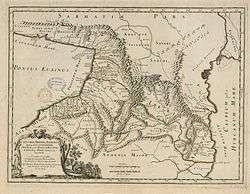Abasgoi

The Abasgoi (Georgian: აბაზგები; Ancient Greek: Αβασγοί, Abasgoi, and Ancient Greek: Ἁβασκοί, Abaskoi; Latin: Abasci, Abasgi;[1] compare Abkhaz Абазаа [aˈbazaː] "the Abaza people") were one of the ancient tribes inhabiting western Abkhazia, who originally inhabited lands north of Apsilae, corresponding to today's Ochamchira District. In the 6th and 7th centuries they migrated northwards and occupied territory between Gumista and Bzyb rivers, while another tribe, the Sanigs, lived to the north of them. In the time of Arrian, they were said to live on the banks of the Abascus or Abasgus river, an otherwise unidentified river flowing into the Euxine.[2]
The Abasgoi are considered the ancestors of modern Abkhazians,[3][4] and the Georgian ethnonym (Georgian: აფხაზი apxazi) "Abkhaz" is derived from the name. They are mentioned by Pliny the Elder, Strabo and Arrian; the 6th-century Byzantine historian Procopius wrote that they were warlike, worshiped tree deities and provided eunuchs to Justinian's court.[3]
See also
References
- ↑

- ↑

- 1 2 Olson, James Stuart; Nicholas Charles Pappas (1994). An Ethnohistorical dictionary of the Russian and Soviet empires. Greenwood Publishing Group. p. 6. ISBN 978-0-313-27497-8.
- ↑ Allen, William Edward David (1932). A History of the Georgian People: From the Beginning Down to the Russian Conquest in the Nineteenth Century. Taylor & Francis. p. 28. ISBN 978-0-7100-6959-7.